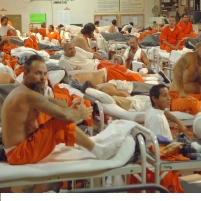Scalia Accuses Supreme Court Majority of “Most Radical Injunction Issued by a Court in Our Nation’s History”
Friday, May 27, 2011
 (photo:California Department of Corrections and Rehabiliatation)
(photo:California Department of Corrections and Rehabiliatation)
In opposing the U.S. Supreme Court’s ruling regarding the release of prisoners from California penitentiaries, Justice Antonin Scalia unleashed a blistering dissent this week that characterized the majority opinion as a “judicial travesty.”
After five justices agreed to force the state of California to release tens of thousands of inmates from overcrowded prisons, Scalia wrote in his dissent that the high court had affirmed “perhaps the most radical injunction issued by a court in our nation’s history.”
He added: “There comes before us, now and then, a case whose proper outcome is so clearly indicated by tradition and common sense, that its decision ought to shape the law, rather than vice versa. One would think that, before allowing the decree of a federal district court to release 46,000 convicted felons, this Court would bend every effort to read the law in such a way as to avoid that outrageous result. Today, quite to the contrary, the Court disregards stringently drawn provisions of the governing statute, and traditional constitutional limitations upon the power of a federal judge, in order to uphold the absurd.”
Justice Anthony Kennedy didn’t see it that way in crafting the majority opinion. He said reducing the number of prisoners was “required by the Constitution” to correct longstanding abuses of prisoners’ rights. “For years the medical and mental health care provided by California’s prisons has fallen short of minimum constitutional requirements and has failed to meet prisoners’ basic health needs,” Kennedy wrote. “Needless suffering and death have been the well-documented result.”
He was joined by the court’s four Democratic appointees. The four Republican appointees other than Kennedy all opposed the majority.
Of the 168,830 people in California prisons in 2009, 28,736 (17%) were there for drug-related offenses and 32,677 (19.4%) for property crimes.
-Noel Brinkerhoff
Supreme Court Upholds Order for California To Cut Prison Population (by Philip Smith, StoptheDrugWar.org)
Supreme Court Upholds Calif. Prisoner Cap; Dissenter Scalia Hits ‘Radical Injunction’ (by Debra Cassens Weiss, ABA Journal)
Brown v. Plata (U.S. Supreme Court) (pdf)
- Top Stories
- Unusual News
- Where is the Money Going?
- Controversies
- U.S. and the World
- Appointments and Resignations
- Latest News
- Musk and Trump Fire Members of Congress
- Trump Calls for Violent Street Demonstrations Against Himself
- Trump Changes Name of Republican Party
- The 2024 Election By the Numbers
- Bashar al-Assad—The Fall of a Rabid AntiSemite






Comments